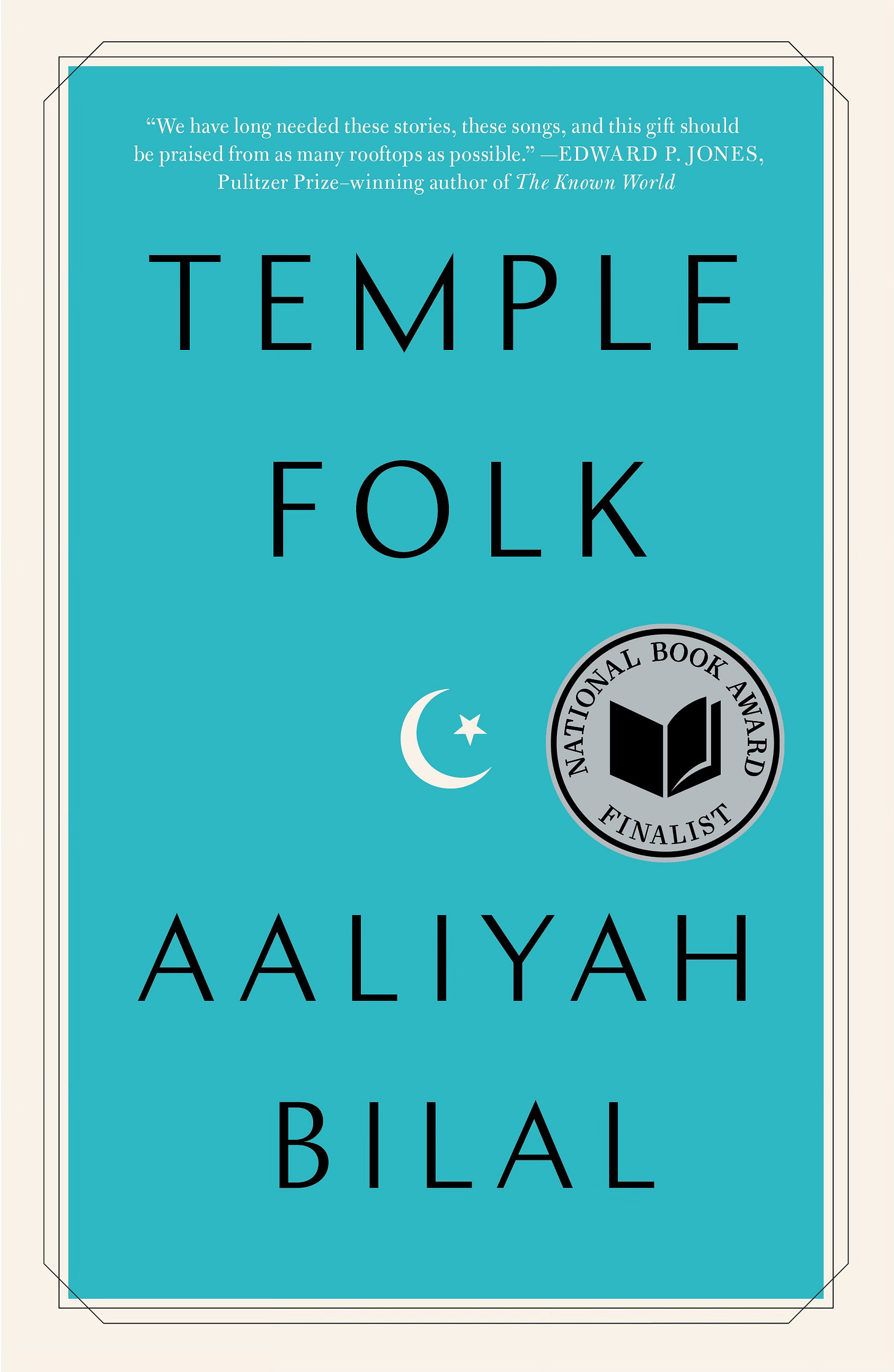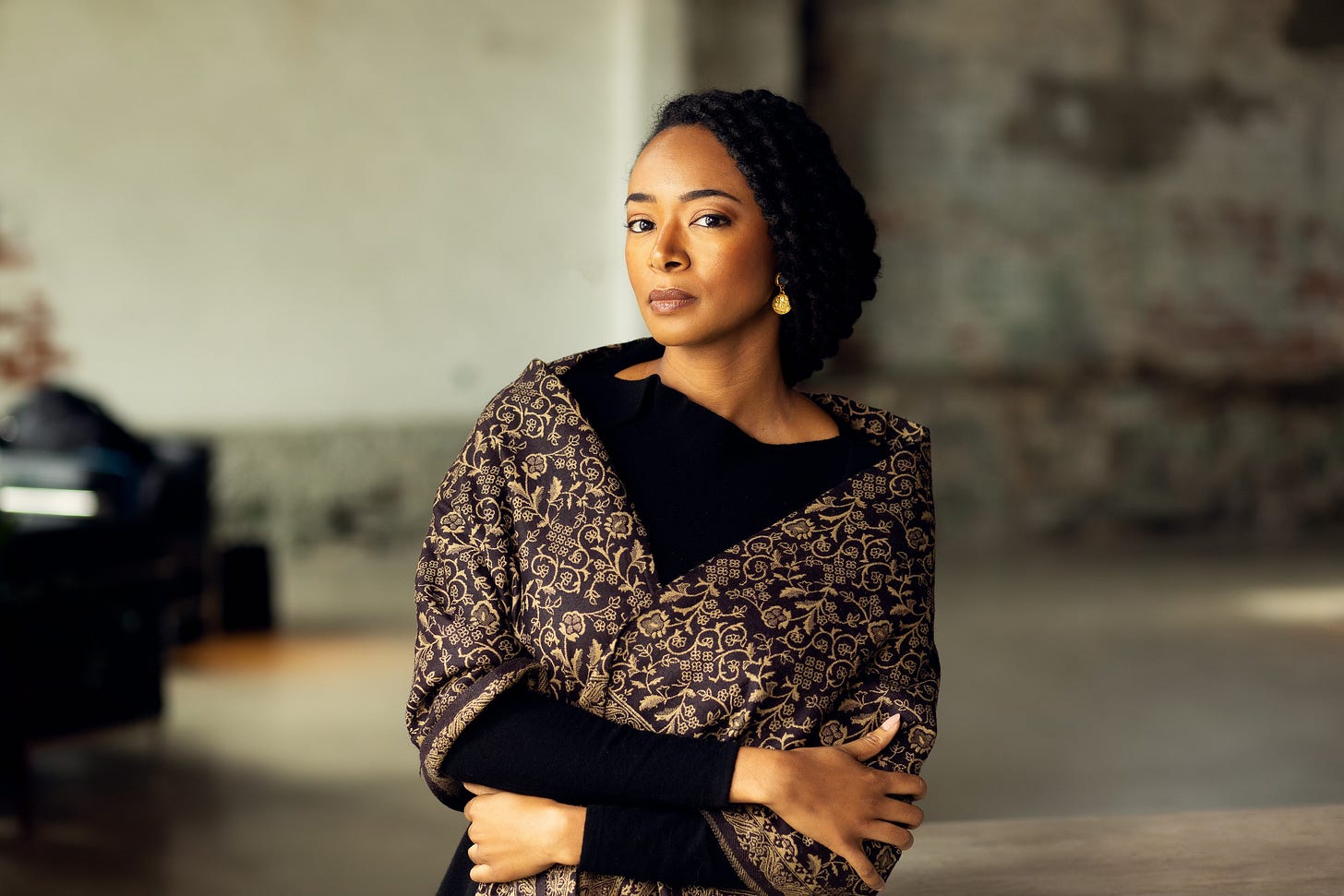Interview with Aaliyah Bilal
I’ve been astonished by the care book publicists put in, sometimes cold calling to push for coverage of a debut title. That’s how Temple Folk came onto my radar. While I wasn’t able to formally cover it, I read it with admiration, then reached out to see if Aaliyah Bilal would be willing to do a Substack interview. I mixed up our standard questions for some variety.
Shortlisted for this year’s National Book Award, her stunning story collection features Black Muslims as they reckon with family, faith, and community. I think a collection dealing with faith of any kind, regardless of the particular religion, should wrestle with the gap between what the characters believe and how they act, and Bilal is a master at drawing such contradictions. The characters come to life in these stories, which are often quiet, but never without an elegant assuredness.
I’m so thankful Aaliyah agreed to this interview!
I’d love to hear about Temple Folk’s journey. I’m curious about the timeline from when you wrote the first story to the collection’s publication. And when did you know it was ready to send?
The journey of Temple Folk has been a long one. The first inklings I'd had that this would be a collection happened over a decade ago. I was teaching myself to write and felt myself capable of creating a series of short vignettes, (much shorter than the stories included in Temple Folk). I didn't produce my first truly successful short story until 2015, which was the year I started writing “Woman in Niqab.” That story took me about four months to write. “Janaza” was next, and while it's rather short, it took the longest of all of the stories because I was teaching myself how to write in a believable male voice. It was an excruciating but very necessary learning process. The other stories came much faster, however the bulk of the book was only written after the acquisition in 2021. I had developed my skill set to the extent that I was able to lay out the premises of the final four stories— all of exceptional length— and completed them in 2022. It's been quite a long, difficult and rewarding journey thus far.
I’ve been talking to several writers lately about the issue of visibility. When we’re working on books we can get in this tunnel where we sense our work is invisible, will always be. And so many authors I know fight that same sense of invisibility after their books’ publication. I’m curious if you’ve dealt with this, and if you have any tips for protecting ourselves from invisibility?
I empathise with this. I do feel that it enlivens the imagination when we can anticipate that there's an audience ready and eager to receive our work. There are not many artists who have confidence that the work will be read widely. As someone who has been in the trenches, writing without an MFA while living for years in China, far away from the American publishing industry, I came to accept that it was highly unlikely that I would ever be "discovered." I accepted this, acknowledging at the same time that I had this deep personal need for my own creative output. It was at the point of acceptance that I decided— and this was a true epiphany for me— that I would simply create for its own sake. I was going to be excellent in my own space and it didn't matter if anyone else cared, because I cared. It was within months of making this commitment to myself that I landed my book deal. It won't happen this way for everyone, but I encourage fellow artists who feel themselves invisible to really treat this path like a spiritual calling. Do the work because it's necessary to you first. When work feels necessary to the author, it will likely feel the same to the reader.
We always ask for reading recommendations, but I read in your interview with Vanity Fair that you were inspired by Maud Martha. It’s one of my all-time favorites, and I don’t meet many people who love that book the way I do. Want to help me proselytize readers to the greatness of Gwendolyn Brooks?
Gwendolyn Brooks is a modern master— a brilliant mind, excellent craftswoman. Like so many people who are truly great, there was something so unassuming and unpretentious about her which I also really admire. Her writing is so deft, and at the same time it is prosaic, adorable, progressive in its way... It's so many things. What she brings together for me is something I strive for in my writing, a quality that seems lost on so much of the literary fiction that gets published these days. Writing that is of merit can just be plainly lovely. I'm biased to believe these are the best kinds of stories.
Is there a song that ties into your book in some way?
I didn't write Temple Folk with any soundtrack in mind. Muslims can be touchy on the topic of music— there are lots of questions about whether or not it's halal (permissible). I don't have these kinds of hang ups, but putting myself in the headspace to do the work, I honestly didn't think about music much at all. I often write to Chopin, Brahms and Schubert, only because they help the synapses fire a little better, but music is not a huge deal in the book.
There is one funny way that music ties into the writing of this book, however. I was stuck trying to finish the last story, “Due North,” and was having a very hard time conceptualising the work. In a moment of despair, I thought to alleviate my upset by putting on a song I really liked at the time (Musiq Soulchild's "So Beautiful"— an early 2000's black beauty salon banger, lol.) So I was about to play it when something inside me said, "No, you may not listen to the song until you've written the story." It took me many months to finish conceptualising “Due North.” Once I'd gotten my mind around the story I wrote it start to finish in two and one half weeks. As soon as I wrote the last word of the book, "...Polaris." I got up from my writing desk, (it was dusk, mind you) put on the song and danced alone in my living room, swaying and smiling from ear to ear!
Thank you, Aaliyah!



